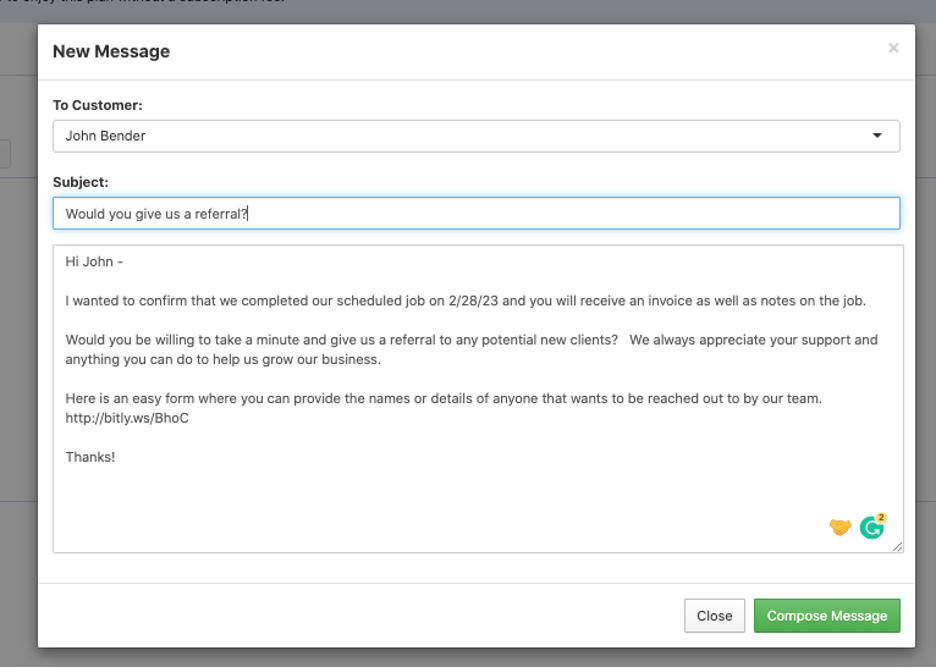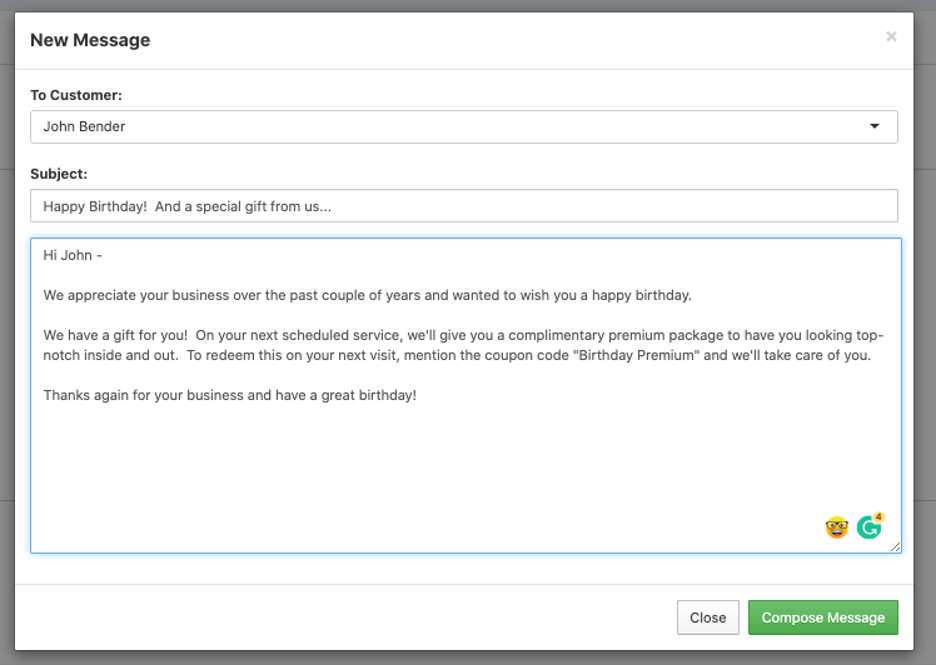
How to write better field service follow-up emails to grow your business [with templates]
Want to build a better relationship with your clients using follow-up emails?
It might seem too simple, but one of the easiest ways to build a better relationship with your client is to close the loop more thoughtfully after you complete a job. Service follow-up emails can play an important role in doing this, helping you get feedback, upsells, referrals, increased engagement and more. Below we explore how to write a better field service follow-up email.
The importance of service follow-up emails
Service follow-up emails play an important role in improving customer satisfaction and retention for field service businesses. These emails provide an opportunity for field service companies to touch base with customers after a service call or visit, ensure that the customer's needs have been met, and address any issues or concerns that may have arisen. By sending follow-up emails, field service businesses can demonstrate their commitment to customer satisfaction and proactively address any issues before they escalate, which can improve customer loyalty and lead to repeat business. Additionally, service follow-up emails can help field service businesses gather customer feedback and use it to identify areas where they can improve their service offerings. In essence, service follow-up emails help to build trust and establish a positive relationship with customers, which is key to retaining them and growing the business.
Best practices for writing service follow-up emails
When writing service follow-up emails for the field service industry, there are several best practices that should be kept in mind.
- Personalize the emails by including the customer's name, addressing them in a friendly and professional manner, and including relevant details about the service call or visit.
- Address any concerns that the customer may have had, and provide clear and concise solutions to any issues that were encountered.
- Provide additional resources that can help the customer troubleshoot or solve problems on their own, such as FAQs, troubleshooting guides or contact information.
- Use clear and easy-to-read formatting, and craft a subject line that will catch the customer’s attention.
- Measure the effectiveness of your service follow-up emails by tracking key metrics such as open rates, click-through rates, and customer feedback. This will help to identify areas for improvement and ensure that your service follow-up emails are having the desired impact.
With an established set of best practices, it’s time to segue into the types of emails that are most common for Field Service Businesses when following up with customers post service delivery.
Confirmation/service delivery email
When writing a confirmation or service delivery email for field services, it's important to communicate the essential information in a clear and concise manner.
The email should start with a professional subject line that briefly summarizes the main purpose of the email, something like "Service Confirmation: [Service Date] [Service Address]"
The introduction of the email should confirm the service that was provided, including the date and location of the service.
It's also important to include a detailed summary of the services that were provided, including any recommendations or solutions that were offered.
Additionally, it's a good practice to attach any relevant documents such as an invoice, service report, or warranty information.
It's also important to thank the customer for their business and invite them to contact you in case they have any additional questions or concerns.
Finally, don't forget to include your contact information, business name, and logo at the bottom of the email.

Request for feedback email
Writing a follow-up email requesting feedback for field services requires one to strike a balance between being professional and friendly.
An effective subject line could be something like "Your feedback is important to us" or "We value your opinion: Share your thoughts on our recent service"
The email should begin by expressing gratitude for the customer's business and briefly recapping the service provided.
Then, it's important to make it clear that the company values customer feedback and explain why it's important for improving the service.
Providing a link to a customer satisfaction survey or feedback form can make it easy for customers to respond.
Also, it's a good practice to provide a clear timeframe in which the survey or form will be available, and a deadline for response, as well as a simple thank you note for their time and attention.
Lastly, include your contact information and let them know that you are available to respond to any additional questions or concerns they may have.

Request for referral or review email
Asking a customer to refer a friend for field services is a delicate balance; it's important to convey a sense of appreciation and value to the customer.
An effective subject line could be something like "Your Referral is valuable to us" or "We appreciate your support: Refer a friend and earn rewards"
The email should begin by thanking the customer for their recent business and the trust they placed in your company.
Then, it's important to highlight the quality of the service provided and how you want them to share their positive experience with others.
You can also offer an incentive or reward for the referral such as a discount on their next service, a gift card, or other promotion.
Make sure to include clear instructions on how they can refer a friend. This can be done through a referral link, or a personalized referral code, and give them an idea of the process.
Let them know that you value their continued business and will make sure that the new customer receives the same level of service and quality that they received.

Service upsell email
When writing a follow-up email upselling additional services to a field service customer, it's important to be mindful of the customer's specific needs and preferences.
An effective subject line could be something like "Enhance your service experience" or "Upgrade your service package"
The email should start by thanking the customer for their recent business and highlighting the value of the service they received.
It's then important to provide clear and concise information about the additional services you offer and how they can enhance or complement the service they already received.
For example, you can explain how a maintenance plan can extend the life of their equipment or how additional cleaning services can improve their indoor air quality.
It's also beneficial to include pricing and package details to help the customer compare the options and make an informed decision.
You can also use customer data to suggest related services that could complement their needs, or special promotions or discounts you are running.
Lastly, make sure to include your contact information and let them know that you are available to answer any questions or concerns they may have.

Holiday or customer birthday email
When writing a follow-up email wishing a field service customer a happy birthday or holiday, it's important to keep it personal and friendly.
An effective subject line could be something like "Warm wishes for your special day" or "Season's Greetings from [Company Name]"
The email should begin by wishing the customer a happy birthday or holiday in a personal and heartfelt manner. You can also add a personal touch by including their name, as you are aware of their special day.
It also never hurts to include a special offer or promotion as a token of appreciation for their business.
You can also invite them to share their special day with you by sharing a photo or a story with the company, or simply tell them that you are available to them in case they need any assistance or service.

Follow social media promotional

To ask a field service customer to follow your social media, it's important to keep it simple and to the point.
An effective subject line could be something like "Stay Connected with us on Social Media" or "Join our community on [Social media platform]"
The email should begin by thanking the customer for their recent business and expressing your appreciation for their support.
You can then inform them of your social media presence and the benefits of following you, such as exclusive promotions, behind-the-scenes content and updates on new services, etc.
It's also a good practice to include a direct link to your social media profiles, and if you have different profiles on different platforms, specify which platform you prefer them to follow you on.
Lastly, you can remind them of your contact information and let them know that you are available for any additional service needs or questions.

Start small and grow into more sophisticated service follow up emails
While maybe overlooked, service follow-up emails provide an opportunity to strengthen the relationship with your client, open the door for feedback that can help your business, and give you ways to grow your business. Get started with regular cadences after jobs, and grow into more seasonal content, segment by types of customers, and aimed at achieving different goals (referrals, reviews, upsells, etc)
It’s important to be intentional with the email and not try to accomplish too much. As well, personalizing these emails, providing additional information on the work you are doing for them, as well as providing additional tips or resources that provide value to your client is a great way to be irreplaceable. In addition to scheduling these after jobs, look at ways to schedule these throughout the year and stay top of mind.
Never miss a post.
Get notified of new content